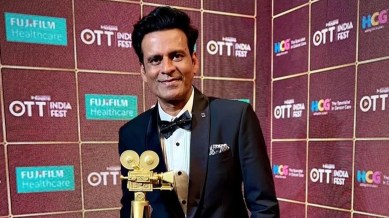Why does Manoj Bajpayee skip dinner and have his last meal at 3 pm? Can his meal plan help you lose weight, keep you disease-free?
The 16:8 intermittent fasting has both pros and cons. A dietician explains how

Actor Manoj Bajpayee has set off fresh conversations on the efficacy of intermittent fasting, saying he skips dinner and has his last meal of the day by 3 pm. This, he says, keeps him fit and his weight in control. However, he doesn’t skip either breakfast or lunch and exercises too. In essence, he restricts his eating window to eight hours a day, where he front-loads most of his calories during the first half of the day so that they can slow-release energy through the rest of his fasting hours. This routine works as once the body exhausts its blood glucose reserves and has a calorie-deficit, it draws energy from burning fat. This automatically leads to weight loss, reduces chronic inflammation, repairs cells and improves insulin sensitivity.
Can everybody skip dinner?
However, Kavya J, Dietician with Manipal Hospitals, Mysuru, says that choosing the eight-hour slot should be such that you can follow it consistently. And it is definitely not advisable for those with any medical condition. This can work for those without co-morbidities as part of a preventive healthcare regime. “I would say have a light breakfast by 10 am, eat lunch by 12 noon and have an early dinner by 5.30 pm and then fast overnight. Also, it is important to ensure that you have the recommended daily allowance of all your macro and micronutrients from what you eat during your eating window,” she says. Dinner, after all, is the third meal of the day and gives the body the boost it needs to continue normal processes while you sleep. “When you eliminate a meal your body is conditioned to, you limit your opportunities to extract the energy and nutrients you need. So counter-balancing is important,” adds Kavya.
monthly limit of free stories.
with an Express account.
What skipping dinner can do?
Skipping dinner impacts blood sugar levels and in the initial stages, a person can be low on energy. That’s why it’s not recommended for people with diabetes as they cannot afford blood sugar swings either high or low. Initially, you may also have problems falling asleep. “However, you must control overeating during your chosen eating window. Long-time fasting may build craving and you may end up overeating and loading up on calories that you may find difficult to burn out. High sugar may also raise levels of the stress hormone cortisol, which can push up blood pressure,” says Kavya. To avoid such extreme cravings and reactions, she suggests having a measured bowl of soup or boiled vegetables at the original dinner hour to prevent extreme craving.
Does skipping dinner lead to weight loss?
Over the short term, yes but sustaining it means sticking to a discipline while maintaining nutritional balance, according to Kavya. When our body doesn’t get its regular meals, it can go into starvation mode which slows down our metabolism for conserving energy. The body then burns fewer calories, making it harder to lose weight. A small UK study that focused on older adults (aged 65-74 years) found that restricting food intake to eight hours per day for six weeks resulted in an average weight loss of four pounds for men and 2.9 pounds for women. Men also experienced a significant reduction in visceral fat mass and belly fat during the study, though there was no significant effect on fat mass for women. Another small study found that alternate day fasting led to greater reductions in body weight and body mass index (BMI).